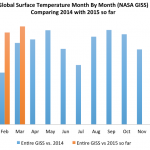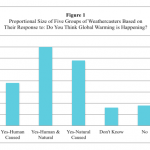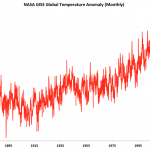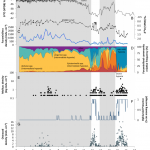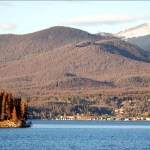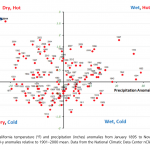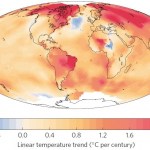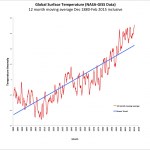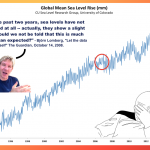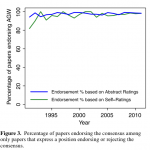global warming
That is a good question, and difficult to answer. If it turns out to be, it will be the warmest calendar year in the instrumental record, which goes back into the 19th century.
Regardless of what El Nino (ENSO) does, 2015 will be a warm year. Why? Because everything is warm and getting warmer and even if 2015 is less warm than 2014, it will be warm. There is no other possibility.
Even without the effects of El Nino, though, it is possible that 2015 will be warmer than 2014 because we see a lot of heat out there. If the present, relatively weak El Nino continues for a while, it will likely…
This is Part I of a two part treatment of new research on climate change. Part II is here.
There is a new paper out, Comparing the model-simulated global warming signal to observations using empirical estimates of unforced noise, by Patrick T. Brown,Wenhong Li, Eugene C. Cordero & Steven A. Mauget. It is potentially important for two reasons. One is because of what it says about how to interpret the available data on global warming caused by human generated greenhouse gas pollution. The other is because of the way in which the results are being interpreted, willfully or through…
The American Biology Teacher has hosted a guest editorial by Glenn Branch and Minda Berbeco of the NCSE. The editorial points out that climate science is under a similar sort of anti-science attack as evolution has been for years, though generally with different (less religious) motivations. Also noted is the problem of fitting climate change into the curriculum, especially in biology classes. Indeed, biology teachers are already having a hard time getting the standard fare on the plate. In recent years, for example, the AP biology curriculum has jettisoned almost everything about plants…
There was a time when I picked which local TV news station to watch based on the way the TV meteorologist addressed global warming. There were two stations in the running. One of them had a guy who frequently disparaged climate science, and the other had Paul Douglas, who no longer does TV meteorology (I no longer watch local TV news) but who has become a major spokesperson for reason and science (see: Paul Douglas on Climate Change and A Q&A with Paul Douglas, the evangelical Christian Republican poster boy for climate change). Paul and I have become colleagues and friends.
In 2011,…
The last 12 months have been the warmest one year period in the NASA database since records began in 1880. According to the just released NASA GISS Global Temperature Data, March, 2015 is estimated to have been the fifth warmest month on record. Here are the top 20 months in rank order:
2007JAN93
2002MAR88
2010MAR87
1998FEB86
2015MAR84
2010APR82
2014SEP81
2015FEB78
2014MAY78
2014OCT77
2005OCT76
2015JAN75
2013NOV75
2010NOV75
1998JUN75
1995FEB75
2010FEB74
2006DEC74
2014DEC73
2014AUG73
Here is the monthly data covering the entire period of the instrumental record (1880 - present)
And, most…
I haven't seen this making the climate blog rounds (though I don't pay as close attention anymore as I used to...) so I thought supporters of science and detractors alike might like to know that the cat is out of the bag and the Global Warming Hoax has been exposed.
See below:
Continental drift and evolution surely fall into that that same mix.
Maybe, maybe not. There is a new paper that looks at what climate scientists call “synoptic midlatitude temperature variability” and the rest of us call “cold snaps” and “heat waves.” The term “synoptic” simply means over a reasonably large area like you might expect a cold snap or heat wave to be. Specifically, the paper (Physics of Changes in Synoptic Midlatitude Temperature Variability, by Tapio Schneider, Tobias Bischoff and Hanna Plotka, published in Journal of Climate) concludes that as human-caused greenhouse gas pollution increases, the frequency of cold snaps in the northern…
A new study by Sarah Moffitt, Tessa Hill, Peter Roopnarine, and James Kennett (Response of seafloor ecosystems to abrubt global climate change) gets a handle on the effects of relatively rapid warming and associated Oxygen loss in the sea on invertebrate communities. The study looked at a recent warming event (the end of the last glacial) in order to understand the present warming event, which is the result of human-caused greenhouse gas pollution.
Here is what is unique about the study. A 30 foot deep core representing the time period from 3,400 to 16,100 year ago, was raised from a site in…
There is some interesting new work carried out by researchers at Dartmouth College and the USDA Forest Service on the relationship between the Mountain Pine Beetle, major die-offs of forests in North America, and climate change.
The Mountain Pine Beetle (Dendroctonus ponderosae) is a kind of “bark beetle” (they don’t bark, they live in bark) native to western North America. They inhabit a very wide range of habitats and are found from British Columbia all the way south to Mexico. In British Columbia alone, the pine beetle, though a fairly complex process, has managed to destroy 16 of 55…
Antarctica is pretty much covered with glaciers. Glaciers are dynamic entities that, unless they are in full melt, tend to grow near their thickest parts (that's why those are the thickest parts) and mush outwards towards the edges, where the liminal areas either melt (usually seasonally) in situ or drop off into the sea.
Antarctic's glaciers are surrounded by a number of floating ice shelves. The ice shelves are really the distal reaches of the moving glaciers floating over the ocean. This is one of the places, probably the place at present, where melting accelerated by human caused…
A paper just out now in PNAS by Noah Diffenbaugh, Daniel Swain, and Danielle Touma shows that "Anthropogenic warming has increased drought risk in California." From the abstract:
... We find that although there has not been a substantial change in the probability of either negative or moderately negative precipitation anomalies in recent decades, the occurrence of drought years has been greater in the past two decades than in the preceding century. In addition, the probability that precipitation deficits co-occur with warm conditions and the probability that precipitation deficits produce…
Climate scientists have noticed a disturbing pattern in the North Atlantic. This is the relative cooling of surface waters in the area fed by the Gulf Stream. This pattern has emerged over recent decades, and may portend very rapid and potentially disruptive climate change in the upcoming decades. The cooling is not subtle at all, and looks like this:
Map based on NASA GISS data of warming 1901-2013
So what does this mean? A paper out just today describes, explains, and discusses this odd anomaly and its potential consequences. First, a bit of context.
The Earth’s climate follows certain…
And by "Shut. Up." I mean shut up about whether or not global warming is real.
The National Climatic Data Center of NOAA has just released the number representing the Earth's surface temperature for February and it is a shocking 0.82 degrees C above the 20th century average. This is the second warmest Feb on record, and I'm pretty sure it is the third warmest month on record, in that data base.
Roughly speaking, the coldest we have experienced, the Last Glacial Maximum, was about 6 degrees colder than at present. It is generally thought that we need to keep the global surface temperature…
The NASA GISS data for surface temperatures of the planet Earth are in for February, and February was warm. The anomaly value was 79, which means 0.79 degrees C above a the baseline NASA uses (1951-1980). So, while it looks like the planet has warmed by a about 8 tenths of a degree, since warming started well before 1880, it is really more like a whole degree or more. Depending on what you know and don't know about how climate works, that may seem like a lot or a little. Trust me, it is a lot.
Most interestingly, the last 12 months were the warmest 12 months in the NSAS GISS database (you'…
Human caused greenhouse gas pollution has warmed the planet. Global warming means more extreme weather. Many meteorologist who watch the weather every day see this. More and more research shows that greenhouse gas pollution changes the weather in a way that causes even more change in the weather. Changing weather systems means more lightning, increased high precipitation events in certain regions like the US Northeast, including more frequent large snow storms.
Global warming has had uneven effects. The Arctic has warmed relatively more than most of the rest of the planet. The major movements…
Human caused greenhouse gas pollution is heating the Earth and causing the planet’s polar ice caps and other glacial ice to melt. This, along with simply heating the ocean, has caused measurable sea level rise. Even more worrisome is this: the current elevated level of CO2 in the atmosphere was associated in the past with sea levels several meters higher than they are today. Even if we slow down Carbon pollution very quickly, we can expect sea levels to be at least 8 meters higher, eventually. How soon? Nobody knows, nobody can give you a time frame on this because the rate of melting of the…
Dana Nuccitelli is a key communicator in the climate change conversation. He is co-writer with John Abraham at the Climate Consensus - the 97% blog at the Guardian, and has contributed hundreds of entries to John Cook’s famous site SkepticalScience.com. He has measurably helped people to understand climate change science and the nuances of the false debate based over climate manufactured by science deniers.
And, he’s written a book!
Graphic from Cook, Nuccitelli, Et Al 2013 paper quantifying the consensus on climate change. This figure also appears in "Climatology and Pseudoscience"…
Raúl Grijalva Investigates
Raúl Grijalva is the US representative from Arizona’s 3rd congressional district, a Democrat, and a supporter of environmental initiatives. As the ranking member of the Natural Resources Committee, he recently sent letters to seven universities requesting documents related to the background of climate change research, as a response to recent revelations in the New York Times of seemingly inappropriate failure to disclose industry funding sources by Harvard Smithsonian Center for Astrophysics researcher Willie Soon. These letters requested the following:
The…
